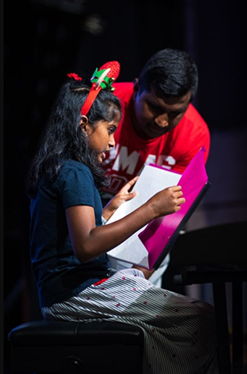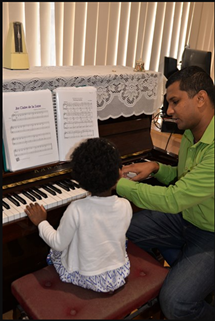.gif)
Overcoming Performance Anxiety: Strategies to Perform Confidently in Front of Others
Sunday, July 28, 2024 by Shaun Premnath | Uncategorized

Performance anxiety, which is sometimes called "degree terror," is something that a lot of players deal with. This feeling can show up as worry, nervousness, or fear before and during performances. This tension can make the show less enjoyable and change how the musician usually feels. It's important for artists who want to perform with confidence in front of other people to recognize and deal with performance anxiety.
Figuring Out the Signs
Performance nervousness can show up in many various modes, both physically and mentally. Some common physical signs are shaking, sweating, a fast heartbeat, and a dry mouth. On a psychological level, someone may feel extreme fear, self-doubt, or like they are about to fail. Being aware of these signs is the first thing that can help you deal with them better.
Why getting ready is important
To get over stage nervousness, you need to prepare. By practicing regularly and carefully, you can make sure that you remember the information and build muscle memory. This practice boosts confidence and lowers the chance of making mistakes, which can cause stress. It can also help to get used to the performance setting by mimicking performance conditions during practice.
How to Breathe to Feel Better
Deep and controlled respiratory is an effective device for dealing with performance tension. Slow, deep breaths can help in calming the frightened gadget and lowering anxiety ranges. Techniques consisting of diaphragmatic breathing, in which one breathes deeply into the abdomen in preference to the chest, maybe specifically powerful. Practicing these strategies frequently could make them an herbal reaction to tension.
Seeing yourself succeeding
Visualization is the process of practicing the performance in your mind in a good and thorough way. By picturing yourself doing well, your brain gets used to the idea of doing well, which lowers your fear and worry. To practice this method, find a quiet place, close your eyes, and picture the whole performance, from going on stage to the final bow.
Good Talk to Yourself
How someone talks to themselves can have a big effect on their performance nervousness. Positive self-speak method doing away with poor mind and doubts about yourself with high quality"I am well-prepared" and "I can do this" of terms that can help you feel greater assured and much less aggravated. Positive self-communicating can exchange the manner your mind works so you focus on fulfillment rather than failure.
Making a routine before a performance
Having a routine before a show can help you feel stable and in charge. Some things that can be part of this practice are light exercises, breathing exercises, and listening to relaxing music. Focusing on achievement instead of worry can help with a process that you know well.
Looking for Professional Help
Performance nervousness can be very bad at times and last a long time so that you may need professional help. Talking to a therapist or counsellor who focuses on performance tension will let you give you useful ways to cope with your problems. Cognitive-behavioral treatment (CBT) is one method that may assist in changing bad thought conduct and decreasing worry.
Accepting Your Mistakes
It can help to let go of the need to be perfect when you know that mistakes happen during live shows. No matter how experienced an artist is, they all make mistakes. If you see mistakes as chances to learn instead of failures, you can change your outlook and feel less anxious. Accepting mistakes can help you work with more ease and enjoyment

Putting together a support system
Having friends, family, and other artists who are there for you can make a big difference. Sharing stories and getting support can help you feel more confident. Also, playing in front of a supportive crowd can make it less scary and help you get over performance nervousness over time.
Frequently Presented Performance Chances
Having a lot of chances to perform can help reduce performance nervousness. Building confidence can be done by starting with smaller, less frightening places and working up to bigger ones over time. Each good act makes it easier to do well in front of other people.
What Mindfulness Can Do for You
Being mindful means specializing in and living inside the gift second. Mindfulness permits you to experience much less nerve-racking by means of taking your thoughts off of horrific thoughts and concerns about destiny. Meditation and careful breathing are two techniques that can be used every day to help you feel calm and focused.
Working and carrying on with a healthy life
Maintaining a wholesome way of life via regular bodily workouts, balanced vitamins, and good enough sleep can undoubtedly affect tension ranges. Exercise, in particular, can launch endorphins, which are herbal pressure relievers. A healthy frame helps a wholesome mind, making it easier to manipulate overall performance tension.
In conclusion
Overcoming performance anxiety is possible with the right strategies and mindset. Learn Music with Shaun offers practical tips and techniques to help musicians perform confidently. Recognize the signs of anxiety, prepare thoroughly, practice deep breathing, and use positive self-talk. Visualize success and develop a pre-performance routine. If needed, seek professional help and build a supportive network. Embrace mistakes as learning opportunities and increase performance opportunities gradually. Mindfulness and a healthy lifestyle also play crucial roles in managing anxiety. With these strategies, musicians can transform anxiety into confidence and enjoy performing.
Piano Maintenance and Care: Tips For Keeping Your Piano In Top Shape
Saturday, July 27, 2024 by Shaun Premnath | Uncategorized

Having a piano is a big commitment, both mentally and financially. Regular care and upkeep are needed to keep its quality high and make sure it keeps making beautiful music. Understanding the importance of piano care will help you keep your instrument in great shape and make it last longer.
Frequent Tuning Guarantees Consistent Sound Quality By
Regular tuning is among the most important parts of piano maintenance. Pianos are sensitive to temperature and humidity variations that could cause the strings to expand or shrink, hence producing detuning. To keep your piano sounding as best it is advised to get it tuned at least twice a year and guarantee that every note is true.
Restoring the Surface and Keys
Both the look and operation of your piano depend on its being kept clean. Dirt and dust can build up on surfaces and keys, therefore influencing the performance of the instrument. Wipe the keys with a delicate, moist towel to minimise too much moisture that can harm them. Using a microfiber cloth on the outside will help to efficiently remove dust without damaging the finish.
Safeguarding the Piano Against Direct Sunlight
Direct sunlight can fade the finish of your piano and dry up the wood, therefore causing possible harm. Put your piano far from windows, or use heavy curtains to block out sunlight. This care helps to preserve the structural integrity and look of the instrument.
Frequent Check Of Internal Components
Regular internal component inspections of your piano might assist in finding possible problems before they become significant ones. Look at the strings, hammers, and action for any wear or damage. If you observe anything unusual, you would be best advised to seek a professional technician for a complete examination and required repairs.
Oiling the Action Mechanism
A piano's action mechanism comprises several moving components that need oil to run properly. These components may grow stiff or sticky with time, therefore influencing the instrument's playability. Applying the right lubricants will help a competent technician guarantee flawless operation of the action mechanism.
Preserving the Piano Bench
Correct posture and technique depend on a steady and comfortable piano bench. Look over the bench often for any weak legs or loose screws; tighten them as necessary. Maintaining good bench conditions guarantees a comfortable playing experience and helps to avoid any disturbance during practice or performance.

Covering The Piano In Non-Use
Covering your piano when not in use will help to shield it from accidental spills, dust, and trash. Use a carefully created piano cover appropriate for your instrument. This easy step increases the interval between professional cleanings and helps to maintain your piano in good condition.
Frequent Professional Maintenance
Although you may do many maintenance chores on your own, frequent professional maintenance is necessary to keep your piano in the best health. Included in thorough services are tuning, regulating, and voicing, offered by a certified piano technician. Professional annual maintenance guarantees that your piano gets the treatment it requires to perform as best it should.
Choosing the Right Cleaning Agents
Maintaining the polish of your piano and avoiding damage depends on using the correct cleaning agents. Steer clear of abrasive cleaning or strong chemicals that could damage keys or wood. Rather, use chemicals meant especially for pianos or ask your technician for advice on safe cleaning agents.
Room Temperature Monitoring
Extreme temperatures might cause your piano to deteriorate. Steer clear of putting your piano right next to air conditioning, radiators, or heating vents. Keeping a constant room temperature guarantees the lifetime of your instrument by helping the wood to neither expand nor shrink.
Guaranteeing Correct Placement and Stability
The location of your piano in a room will determine its stability and sound quality. Away from busy places, set the piano on a flat, firm surface. Steer clear of putting it against outside walls where temperature swings are more likely. Correct placement guarantees that your piano stays stable and runs best.
Conclusion
Maintaining the performance and quality of your piano depends on appropriate care and maintenance. Learn Music with Shaun for professional guidance and assistance. Standard tuning, cleaning, inspections, humidity and temperature regulation can increase your piano's lifetime. These procedures will help you to make sure your piano stays in great shape for many years to come.
Introduction To Piano Playing: A Beginner's Guide to Starting Piano Lessons
Friday, July 26, 2024 by Shaun Premnath | Uncategorized

Learning to play the piano is a rewarding experience that blends practical proficiency with enjoyment of music. Beginners may find the world of keys, notes, and melodies difficult, but with the right attitude, anyone can begin creating beautiful music. The goal of this blog is to provide newcomers the knowledge they need to start piano lessons off successfully.
Selecting the Appropriate Piano:
Starting piano instruction starts with choosing a suitable instrument. Digital, upright, and grand pianos are available. Grand pianos are noted for their great sound despite their high cost and space requirements. Beginning students often choose upright pianos because they are more reasonably priced and smaller. For students, digital pianos are flexible and provide tools such as volume control and varied sound settings.
Organising Your Practice Area:
Effective learning depends on a certain practice space being created. Make sure your piano is in a peaceful spot, free of most distractions. Reading sheet music and keeping the correct posture depend on good illumination. A good bench at the appropriate height will help to prevent strain and help to keep proper hand position.
Reading a Sheet Music Book:
Any pianist must first learn to read sheet music. Sheet music offers a graphic picture of the required notes and rhythms. Learning the foundations of music notation—including the staff, clefs, and note values—beginners should start here. Over time, practise reading easy pieces to hone this ability.
Fundamental Piano Methods:
Long-term development depends on the early development of effective piano techniques. Essential elements of piano performance are correct hand position, finger movement, and posture. Exercises strengthening finger independence and talent should be the main emphasis of beginners. Excellent for laying a strong technical basis are simple scales and arpeggios.
Consistent Practice:
Learning to play the piano requires consistency above all else. Regular daily practice sessions enable the development of muscle memory and strengthen knowledge. Start with brief practice sessions and progressively extend the time as your ability grows. Combine several workouts and pieces to keep practice sessions interesting and efficient.
Discovering Various Musical Styles:
The capacity to investigate several musical genres is one of the pleasures of learning to play the piano. From classical and jazz to pop and rock, the piano is a flexible instrument able to fit various genres. Diverse genre experimentation helps you find your musical tastes and makes practising more fun.

Utilising Apps and Online Resources:
The internet era has produced several tools and resources to help with piano learning. For beginners, online lessons, instructive movies, and interactive apps offer extra help. These instruments provide fresh approaches to learning and practice as well as increase traditional teachings.
Locating a Piano Teacher:
Although self-learning is possible, having a piano tutor will greatly improve your learning process. An instructor can give ordered instruction, rectify errors, and individualised directions. Search for a certified teacher who can modify their approach to fit your learning speed and has a background working with beginners.
Joining a Music Community:
Joining a music community can inspire and help one. Online forums, community centres, and local music schools provide chances to meet other piano learners. Engaging in group lessons, concerts, and recitals will improve your educational process and offer insightful criticism.
Establishing Objectives and Celebrating Development:
Maintaining drive and tracking development depend on having reasonable goals. Sort your study goals into smaller, doable chores. To keep your excitement strong, celebrate achievements and benchmarks. Whether you're learning a new piece or working on your technique, keeping inspired depends on your ability to see development.
Managing Obstacles:
Learning to play the piano has several difficulties. Especially in trying circumstances, one should be patient and tenacious. Divide difficult works into smaller chunks, and never hesitate to ask your teacher or internet resources for assistance. Recall that every pianist encounters challenges, so part of the learning process is conquering them.
Finding Your Style:
As you advance, give special attention to honing your expression and style. Experiment with tempo, phrasing, and dynamics to match your playing to your personality. This uniqueness lets you really relate to your audience and determines music.
Conclusion:
Starting piano lessons is a fascinating and rewarding path. Anyone can learn to play this wonderful instrument with the correct technique, commitment, and tools. Beginning players can create a firm basis for their musical journey by selecting the appropriate piano, arranging a suitable practice area, learning fundamental methods and consulting a teacher. Accept the difficulties and acknowledge your development. Join Learn Music with Shaun to improve your piano learning experience and get individualised advice and support.
